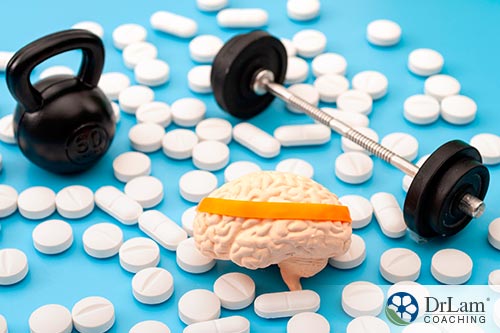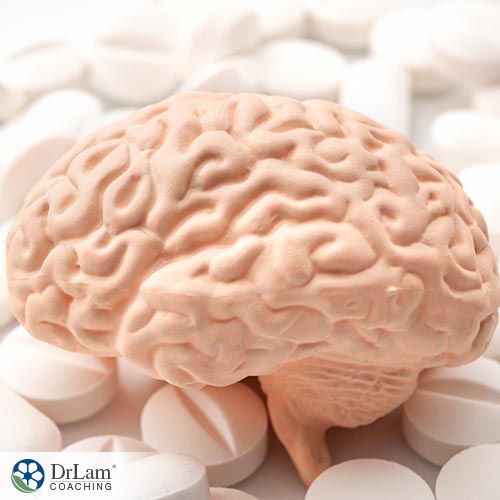 Nootropics are certain medications that can boost brain performance. Many people also refer to them as "smart drugs" because they may help improve memory and cognitive performance.
Nootropics are certain medications that can boost brain performance. Many people also refer to them as "smart drugs" because they may help improve memory and cognitive performance.
There are two types of nootropics. Those that you need a prescription for are synthesized in a laboratory and are often suggested for such health conditions as Alzheimer’s disease, attention deficit hyperactivity disorder (ADHD), and narcolepsy, a chronic sleep disorder in which you feel drowsy or suddenly fall asleep during the day.
Naturally occurring nootropics, on the other hand, need no prescription. These include creatine and caffeine. They also do not help any specific health issue. Yet they do have some benefits for memory and other functions relating to brain health.
Although broadly used to describe any supplement or medication with brain function enhancing abilities, the term ‘nootropic’ originally referred to synthesized medications that aimed at doing this job. Originally, to qualify as a nootropic, a substance had to do five things:
Unfortunately, many of the substances we refer to as nootropics today do not meet all these criteria.
Beyond its original use, the term nootropic soon spread to include natural remedies as well. Our grandparents and those before them often used herbals as medications because no medical help was available. And many of these herbals, as well as other natural remedies, have similar effects to synthesized nootropics.
Substances often called nootropics include:
In short, nootropics should increase your memory, motivation, attention span, and creativity.
The main difference is that natural remedies are not designed to treat one specific issue. They tend to have a systemic effect with little to no side effects. They can, however, enhance your brain function and performance.
Prescription nootropics, on the other hand, have a stimulant effect on the brain and can counteract the symptoms associated with certain medical issues. In other words, they are specifically designed for a specific purpose.
The most common prescription nootropics may have side effects:

Other side effects are also associated with prescription nootropics:
Please note that while these medications may help address certain health issues, you should only take them with a prescription. Because they have many possible interactions as well as side effects, you should also talk to your doctor as soon as you notice any side effects.
These refer to any nootropics that do not require a prescription.
Both coffee and tea classify as nootropics because both have stimulating properties. But while caffeine in moderation may boost mental focus, too much can cause harm. And while you can purchase caffeine pills, do remember that you run the risk of a caffeine overdose if you take too many. Symptoms of a caffeine overdose include fast/irregular heartbeat, nausea, vomiting, panic attacks, confusion, shakiness, and in rare cases, death. Furthermore, a high caffeine intake is linked to a risk of miscarriage in pregnant women.
An amino acid found in both black and green teas, as well as in supplement form, L-theanine may help boost cognitive function and alertness. Some people may experience nausea, headaches, or irritability when taking too much L-theanine.
Creatine is also an amino acid. It is vital for protein production. Athletes often use this supplement with the goal of improving performance. Literature suggests creatine may help improve mental performance by supporting short-term memory functions in the brain. However, taking high dosages of creatine may contribute to liver and kidney damage, weight gain, dehydration, digestive issues, and muscle cramps.
Commonly found in fatty fish and fish oil supplements, omega-3 fatty acids play a role in building membranes around cells in your body. This includes your neurons. They also play a role in repairing and manufacturing brain cells, and in brain and nervous system function. Although it carries an insignificant risk of side effects, it may interact with certain medications. Rare side effects from this supplement include constipation or diarrhea, nausea, heartburn, and stomach pain.
Literature suggests Rhodiola may help protect and address neurodegenerative issues due to having a neuroprotective effect. The herb also helps with neurotransmitter regulation in your brain. Although rare, and when occurring usually mild, possible side effects of taking Rhodiola include drowsiness, sleep issues, stomach issues, dizziness, and headaches.
Literature suggests that the leaf of the Ginkgo biloba tree may improve brain function and may help those suffering from dementia. Few studies exist on the effectiveness of this herb regarding brain health, although researchers do suggest further studies be conducted. Possible side effects include nausea, headaches, diarrhea, and dizziness.
Do not confuse Panax ginseng with other ginseng types as they have different properties and uses. According to literature, Panax ginseng may help prevent various conditions associated with brain health, including Parkinson’s, Alzheimer’s, and Huntington’s disease, while helping with recovery after a stroke. Please note that Panax ginseng may interact with other mediations. Sleep issues are the most common side effect, although less common side effects may occur. These include rashes and allergic reactions.
These synthetic compounds potentially have neuroprotective effects because they may affect your brain’s neurotransmitter function. This group includes piracetam, phenylpiracetam, aniracetam, and various others. Although claims exist it may benefit those with dementia or cognitive impairment, the verdict is still out, and more research is suggested. The most common side effects include insomnia, hyperactivity, drowsiness, weight gain, depression, diarrhea, and muscle spasms.
 Nootropics may influence the hormones, enzymes, and neurotransmitters in your brain. They may do this by improving your brain’s oxygen supply, or by stimulating nerve growth. However, nobody knows how they do this exactly. Nootropic herbs, according to literature, may enhance your neurotransmitter levels while also increasing blood flow to the brain, increasing oxygen and nutrients. This may help improve brain function as well as memory.
Nootropics may influence the hormones, enzymes, and neurotransmitters in your brain. They may do this by improving your brain’s oxygen supply, or by stimulating nerve growth. However, nobody knows how they do this exactly. Nootropic herbs, according to literature, may enhance your neurotransmitter levels while also increasing blood flow to the brain, increasing oxygen and nutrients. This may help improve brain function as well as memory.
In addition to improving blood flow and neurotransmitter function, nootropics may also influence inflammatory responses in your brain and function as vasodilators for smaller veins and arteries in that area. This vasodilating benefit is responsible for the increased blood circulation in the area and corresponding oxygen and nutrient increase.
With regards to their neurotransmitter activity, nootropics may help stimulate the release of various neurotransmitters, such as dopamine, as well as the uptake of choline and other substances necessary for proper brain function.
Your Neuroaffect Circuit forms part of your body’s NeuroEndoMetabolic (NEM) Stress Response. Together, the different components of the NEM work at neutralizing stress while ensuring proper bodily function on all levels. Your Neuroaffect Circuit is made up of the brain, autonomic nervous system, and microbiome. This triad uses neurotransmitters to communicate.
Your autonomic nervous system, itself made up of various sub-components, plays a regulatory role involving various physiological processes. This includes your blood pressure, heart rate, digestion, respiration, and sexual function.
Your microbiome helps with immune system regulation, the digestive process, and the production of various vitamins and nutrients your body needs to function correctly.
The brain is the most complex component of the human body. The center of consciousness, it controls all voluntary and involuntary movement as well as all of your body’s functions. It communicates its needs through your nervous system through neurotransmitters that carry electrochemical signals. Your brain has inhibitory as well as excitatory neurotransmitters.
Stress may cause an imbalance in brain hormones and can, in turn, affect brain health. But because your brain forms part of a holistic whole, other body functions can also become affected. Your adrenal health included, which could lead to issues like Adrenal Fatigue Syndrome (AFS).
You could end up with not only impaired brain function but end up with other health issues that include heart disease, diabetes, and various others.
Nootropics promote brain health in several ways. In so doing, they may also promote the health of other bodily functions and aid in deterring the development of certain health issues.
 Many health issues stem from stress. And this stress is first perceived in the brain. Your brain then sends a variety of messages throughout the body to deal with the situation. But a compromised brain cannot fulfill this function adequately. This could be for many reasons. Taking nootropics may help promote proper brain function.
Many health issues stem from stress. And this stress is first perceived in the brain. Your brain then sends a variety of messages throughout the body to deal with the situation. But a compromised brain cannot fulfill this function adequately. This could be for many reasons. Taking nootropics may help promote proper brain function.
If suffering from brain fog or forgetfulness and you feel you would like to try nootropics to address the issue, here are a few things to keep in mind.
Whatever action you decide to take, please do so with the guidance of a qualified professional. Nootropics could have additional side effects that you are unaware of or interact with other medications.
Adrenal function, to a large degree, is affected by your brain. While nootropics promote brain health, they do not necessarily actively work on your adrenals, although they may help indirectly by promoting proper Neuroaffect function. The best option is to ask your healthcare professional whether nootropics may be suitable for your condition.